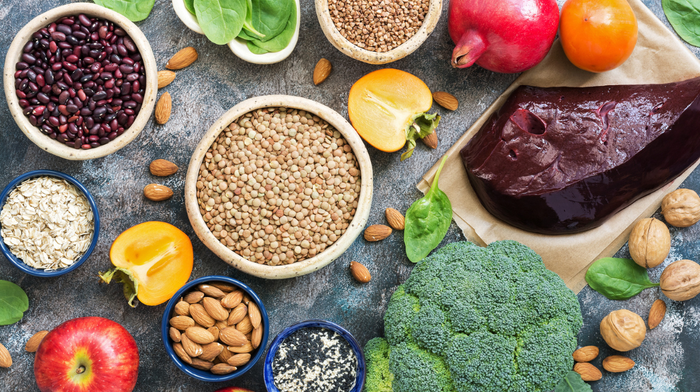
Iron is a mineral that’s essential for many bodily functions, including the formation of red blood cells and the delivery of oxygen throughout the body. If you have difficulty getting what you need, you may develop iron deficiency anaemia.
If you think you might be at risk of a deficiency, find out what causes low iron and discover tips on how to keep your levels in check.
What Causes Low Iron?
Iron deficiency is when there is not enough iron in the body. The actual iron requirement needed depends on your age and gender. According to the NHS, men aged 19 and over would require 8.7mg per day, while women of the same age need a daily intake of 14.8mg. The body can’t produce iron, so you need to get it from foods or supplements.
This mineral can be found in both animal and plant-based sources. If your diet lacks iron-rich foods, there’s a chance that you may develop a deficiency.
In addition to inadequate iron intake, there are other common causes lead to iron deficiency, including:
1. Poor Iron Absorption
Even if you're consuming enough iron in your diet, certain factors can affect how well your body absorbs it. Consuming excessive amounts of calcium, or consuming coffee, and tea during meals can also inhibit iron absorption, as the polyphenols can inhibit absorption by up to 90%.
Here's a tip: try combining iron-rich foods with sources of vitamin C, such as citrus fruits or bell peppers, to improve iron absorption.
2. Blood Loss
Blood loss is a common cause of low iron levels - especially for women during menstruation. If you experience heavy or prolonged menstrual bleeding, you may be at risk of iron deficiency. If you suspect excessive blood loss, consult your GP or a healthcare professional for proper evaluation and treatment.
3. Pregnancy and Breastfeeding
During pregnancy and breastfeeding, your body needs extra iron to support the growth of the baby and the production of breast milk.
If your iron intake is insufficient to meet these increased demands, there’s a chance that you might develop an iron deficiency. It's important to focus on consuming iron-rich foods and consult with your GP to determine if iron supplementation is necessary for you and your baby.
Which Foods are Rich in Iron?
Iron can be found in a wide range of fresh vegetables and meat, including:
Fortified cereal
Red meat
Chickpeas
Liver
Oysters
Tofu
Leaf green, such as spinach and kale
Dark chocolate
Dried fruits, such as apricots and dates

Our iron intake relies mainly on our daily diet and supplements, so it’s important to make sure you add these foods to your routine. If you follow a vegan diet, try including alternative sources of iron in your meals, like beans, lentils, fortified cereals and leafy green vegetables.
How to Tell if You Have Low Iron
The most common and widespread nutritional disorder in the world is iron deficiency. According to the World Health Organization (WHO), iron deficiency is thought to affect more than 30% of the world's population. And it’s more common in women - particularly those of childbearing age due to blood loss during menstruation.
So, how do you know if you're iron deficient? The following are the common symptoms:
Feeling fatigued
Pale skin and nail beds
Breathing difficulties and a rapid heartbeat
Dizziness and headaches
Brittle hair and nails
Difficulty concentrating
Cold hands and feet
Mouth ulcers
If you notice these signs or suspect low iron, it's best to consult with your GP and be mindful of your intake.
How Much Iron Do You Need?
Your daily iron consumption is determined by your age, gender, and overall health. The NHS recommends the following daily intakes:
Men aged 19 and over should aim for 8.7mg
Women aged 19 to 49 need a slightly higher intake of 14.8mg
Women aged 50 and over should aim for 8.7mg
Women who continue to have periods after the age of 50 may require the same amount of iron as women aged 19 to 49, which is 14.8mg
If you’re struggling to meet your daily iron intake with your diet, iron supplements could be the helping hand you need. The Garden of Life Vitamin Code Raw Iron Capsules deliver the whole food iron, along with vitamin C to aid in the absorption. Made using non-GMO and organic ingredients, you can rest assured you’re nourishing your body with what you need, and nothing you don’t.
In addition to iron, zinc, calcium, and magnesium play pivotal roles in supporting our overall health and wellbeing. Discover the health benefits of these essential minerals on our blog.

Magnesium, Iron, Zinc and Calcium | What Are They Good For?
Everything you need to know about magnesium, iron, zinc and calcium.









